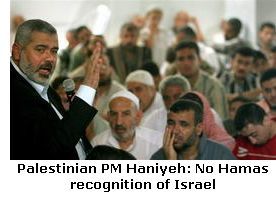 The BBC has finally released its official response to the recent independent inquiry into the organisation’s Mideast coverage. While recognising the flaws in the inquiry’s conclusions, HonestReporting UK was pleased to note the recommendation “that the BBC should get the language right. We think they should call terrorist acts “terrorism” because that term is clear and well understood.” Sadly, in its response, the BBC disagrees:
The BBC has finally released its official response to the recent independent inquiry into the organisation’s Mideast coverage. While recognising the flaws in the inquiry’s conclusions, HonestReporting UK was pleased to note the recommendation “that the BBC should get the language right. We think they should call terrorist acts “terrorism” because that term is clear and well understood.” Sadly, in its response, the BBC disagrees:
We do not, however, think that the search for consistency can be achieved through the panel?s own definition of “terrorism.” The panel suggests that the term should be used ?in respect of relevant events since it is the most accurate expression for actions which involve violence against randomly selected civilians with the intention of causing terror for ideological, including political or religious objectives, whether perpetrated by state or non-state agencies.?
As some commentators have pointed out, such a definition would, for example, exclude attacks on soldiers. It would in our view, introduce the very value judgments the guidance to the Editorial Guidelines is asking us to avoid?.
In the absence of an agreed definition, we think that our present formulation is preferable in the interests of a consistent approach which we will make renewed efforts to uphold?.
In addition, the BBC has decided to ignore other recommendations, including the appointment of a single editorial “guiding hand”, while appointing a West Bank Correspondent, despite the fact that existing Jerusalem-based BBC staff already seem to spend a great deal of time reporting from Palestinian areas. The BBC maintains that its complaints procedure is sound – something that HonestReporting UK encourages its subscribers to make use of. The BBC is obliged to take all complaints seriously and to respond. While these responses may not always be to our liking, they do maintain a certain level of accountability and self-examination on the BBC’s part. BBC Complaints can be found at www.bbc.co.uk/complaints/.
For more reaction to the BBC response, see Melanie Phillips’s Diary.
HAMAS: NO RECOGNITION OF ISRAEL
 HonestReporting previously analysed the contents of the so-called “Prisoners’ Document” that many in the media portrayed as a Palestinian breakthrough for peace. At the same time as the IDF launches operations in Gaza to secure the release of its kidnapped soldier, the Hamas and Fatah have announced an agreement between the Palestinian factions on the contents of the document.
HonestReporting previously analysed the contents of the so-called “Prisoners’ Document” that many in the media portrayed as a Palestinian breakthrough for peace. At the same time as the IDF launches operations in Gaza to secure the release of its kidnapped soldier, the Hamas and Fatah have announced an agreement between the Palestinian factions on the contents of the document.
Despite the claims of some Palestinian spokespeople, however, the Hamas has still not agreed to the most basic demand of the international community – recognition of Israel’s right to exist. Despite this and in sharp contrast to the reaction of many in the American press (see HonestReporting.com), some of the UK media continues to misinterpret Hamas’ intentions.
The Guardian and Independent declared in an identical headline “Hamas takes step to recognise Israel”. Meanwhile, the Daily Telegraph termed the agreement as a “Hamas U-turn on Israel’s right to exist”, while the Scotsman called it a “historic step”.
In a welcome move, it was left to the BBC to broadcast irrefutable proof of the Hamas line:
Palestinian minister Abdel Rahman Zeidan told the BBC the Hamas-Fatah document did not in any way recognise the state of Israel.
“There is no agreement between the Palestinians on specifically this phrase. You will not find one word in the document clearly stating the recognition of Israel as a state. Nobody has agreed to this. This was not on the table. This was not in the dialogue,” he said.
Comments to the Guardian, Independent, Daily Telegraph and Scotsman.
IDF OPERATES IN GAZA TO FREE KIDNAPPED SOLDIER
 As the IDF continues operations in the Gaza Strip to bring about the release of its kidnapped soldier, the latest developments in this fluid situation can be found on our Backspin blog. The thoughts of HonestReporting UK are with Cpl Gilad Shalit and with the family of teenager Eliyahu Asheri, who was abducted and murdered by Palestinian terrorists in the West Bank.
As the IDF continues operations in the Gaza Strip to bring about the release of its kidnapped soldier, the latest developments in this fluid situation can be found on our Backspin blog. The thoughts of HonestReporting UK are with Cpl Gilad Shalit and with the family of teenager Eliyahu Asheri, who was abducted and murdered by Palestinian terrorists in the West Bank.
Guardian columnist Simon Tisdall explains the reasoning behind the Palestinian attack and kidnapping as a “belated, wrongheaded retaliation for the killing of nearly two dozen Palestinian civilians, including seven children, by Israel’s army in the past four weeks.” Most military experts, however, would acknowledge that an operation of this sophistication would have been planned well in advance. Stephen Farrell of the Times spoke with Palestinian tunnel diggers: “The attack on Sunday was not the first, but at more than 650m (2,130ft) – 300m of it in Israel – the Kerem Shalom tunnel was nearly twice as long as any other of its kind and took months to build.”
Comments to the Guardian.
REPORTING BEYOND THE CONFLICT
 A common complaint about reporting from Israel is the inability of many media outlets to see life beyond the conflict. Therefore it is a refreshing change to see the Sunday Telegraph reporting on the return of major rock and pop artists to Israel, including Sting, Roger Waters and the Black Eyed Peas.
A common complaint about reporting from Israel is the inability of many media outlets to see life beyond the conflict. Therefore it is a refreshing change to see the Sunday Telegraph reporting on the return of major rock and pop artists to Israel, including Sting, Roger Waters and the Black Eyed Peas.
HonestReporting UK encourages subscribers to express their appreciation of such articles on those all too rare occasions when they appear in the media.
Comments to the Sunday Telegraph.
HonestReporting UK
to media bias.

